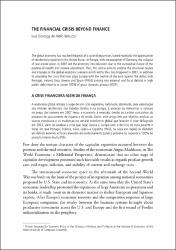Please use this identifier to cite or link to this item:
https://repositorio.ipea.gov.br/handle/11058/6322Full metadata record
| DC Field | Value | Language |
|---|---|---|
| dc.contributor.author | Belluzzo, Luiz Gonzaga de Mello | - |
| dc.date.accessioned | 2016-05-04T14:18:48Z | - |
| dc.date.available | 2016-05-04T14:18:48Z | - |
| dc.date.issued | 2010-04 | - |
| dc.identifier.uri | http://repositorio.ipea.gov.br/handle/11058/6322 | - |
| dc.description.abstract | A economia global atingiu o auge de um ciclo expansivo, turbinada, sobretudo, pela valorização dos imóveis residenciais nos Estados Unidos e na Europa, à exceção da Alemanha, o colapso do preço dos imóveis em 2007 levou a economia à recessão, devido ao caráter cumulativo do processo de ajustamento da riqueza e da renda. Assim, este artigo tem por objetivo analisar as causas estruturais e as mudanças no cenário econômico global que levaram à crise deflagrada em 2007, além de analisar a crise que, hoje, assola a Europa com o declínio do euro perante o dólar, em que Portugal, Irlanda, Itália, Grécia e Espanha (PIIGS, na sigla em inglês) se afundam em déficits externos e fiscais elevados em endividamento público próximo ou superior a 100% do produto interno bruto (PIB). | pt_BR |
| dc.language.iso | en-US | pt_BR |
| dc.publisher | Instituto de Pesquisa Econômica Aplicada (Ipea) | pt_BR |
| dc.title | The Financial crisis beyond finance | pt_BR |
| dc.title.alternative | A Crise financeira além da finança | pt_BR |
| dc.type | Revista Tempo do Mundo - Artigos | pt_BR |
| dc.rights.holder | Instituto de Pesquisa Econômica Aplicada (Ipea) | pt_BR |
| dc.source.urlsource | http://www.ipea.gov.br | pt_BR |
| dc.location.country | BR | pt_BR |
| dc.description.physical | p. 111-123 | pt_BR |
| dc.subject.vcipea | IPEA::Finanças Públicas. Bancos. Relações Monetárias Internacionais::Sistema Monetário Internacional::Movimentos de Capitais Internacionais::Finanças Internacionais | pt_BR |
| dc.rights.license | É permitida a reprodução deste texto e dos dados nele contidos, desde que citada a fonte. Reproduções para fins comerciais são proibidas. | pt_BR |
| dc.subject.keyword | Crise financeira | pt_BR |
| dc.subject.keyword | Finanças internacionais | pt_BR |
| dc.subject.keyword | Endividamento público | pt_BR |
| dc.relation.references | http://repositorio.ipea.gov.br/handle/11058/6128 | pt_BR |
| dc.relation.references | http://repositorio.ipea.gov.br/handle/11058/6115 | pt_BR |
| dc.relation.references | http://repositorio.ipea.gov.br/handle/11058/6244 | pt_BR |
| ipea.description.additionalinformation | Artigo publicado em: Perspective of the World: v. 2, n. 1, apr. 2010 | pt_BR |
| ipea.description.additionalinformation | Possui referências bibliográficas | pt_BR |
| ipea.description.additionalinformation | Publicado também em português | pt_BR |
| ipea.access.type | Acesso Aberto | pt_BR |
| ipea.rights.type | Licença Comum | pt_BR |
| ipea.englishdescription.abstract | The global economy has reached the peak of a cycle of expansion, fueled mainly by the appreciation of residential properties in the United States. In Europe, with the exception of Germany, the collapse of real estate prices in 2007 led the economy into recession due to the cumulative nature of the process of wealth and income adjustment. Thus, this article aims to analyze the structural causes and changes in the global economic scenario which led to the crisis triggered in 2007, in addition to analyzing the crisis that now grips Europe with the decline of the euro against the dollar, with Portugal, Ireland, Italy, Greece and Spain (PIIGS) sinking into external and fiscal deficits in high public debt close to or above 100% of gross domestic product (GDP). | pt_BR |
| ipea.researchfields | Inserção Internacional Soberana | pt_BR |
| ipea.classification | Economia. Desenvolvimento Econômico | pt_BR |
| ipea.classification | Sistema Monetário. Finanças. Bancos | pt_BR |
| Appears in Collections: | Economia. Desenvolvimento Econômico: Artigos Sistema Monetário. Finanças. Bancos: Artigos | |
Files in This Item:
| File | Description | Size | Format | |
|---|---|---|---|---|
| PWR_v2_n1_Financial.pdf | 600.93 kB | Adobe PDF |  View/Open |
Items in DSpace are protected by copyright, with all rights reserved, unless otherwise indicated.

